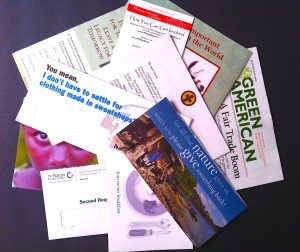We’re headed into that fall season when the begging letters begin to show up in the mailbox, when the charity event invites roll into our inboxes and when our friends hope we’ll help them by buying their kids’ wrapping paper, their favorite charities’ fair-trade item or their own newly published books. 
And the guilt rises. With it comes equal waves of anger at being asked or frustration at not being able to do more.
How do we decide what to do?
1. First, do no harm. When it comes to charities, investigate them on Charity Navigator, certainly, but go a step further. Ask yourself if they are harming those they claim to serve by doing any of the following:
- Ignoring local opinions of need (solving nonexistent problems or treating symptoms, not causes)
- Taking work away from locals
- Providing equipment locals can’t maintain
- Creating dependency
- Objectifying their clients to raise funds
Robert Lupton’s book Toxic Charity delves into these ideas in a powerful, and painful, way.
2. Ask: Is this something or someone I’m passionate about? We can’t give to every cause, buy from every school child (although my husband Les tries his darnedest to buy Thin Mints from every Girl Scout who asks him). Writers don’t have the resources to buy and review every book someone asks us to, as much as we love books. I’ve discovered I can’t even take all the free books I’m offered to review, or I would have to spend all my time reading. (Oh, how I wish I could.)
Set up parameters that align with your passions and interests. Maybe you want your charity donations to work toward a particular type of project, like access to clean water or combating human trafficking. You can also pick a particular area of the world. Les and I supported organizations in Haiti for years that were working in housing, education, self-sustaining agriculture and healthcare.
When it comes to those pesky school donations, maybe you limit it to kids in your church or neighborhood or family. And on the book issue, perhaps you limit it to a specific genre or topic or the people in your writers group. But in any case, the book issue leads to my next suggestion:
3. Foster relationships. Writers are now their own marketers, pushed by the publisher to deliver sales. It can lead writers to send chipper emails to “catch up” with people they’ve had no contact with for 10 years and then beg them to buy. Nobody wants to buy after that, although some will out of guilt.
On the other hand, of course I want to support the books of people who are really my friends (if you meet me at Panera, you know who you are). And if I really want to grow a relationship with a particular author, I’ll nurture it through more than buying a book. I’ll spread the word about the new release, write reviews online, ask for it in my local bookstore. I’ll do my best to keep in touch throughout the year. We’ll meet up when possible. In other words, I’ll get to know her or him.
Fostering relationship might be easiest to see with the book issue, but I don’t think it should stop there. What would it mean to foster a relationship with a charity? Working on one of their committees, sharing their stories with others without begging for a donation, taking a trip to visit a project in order to learn from the people the charity assists. Praying for the people who lead it.
And that kid at the door trying to sell you magazines you don’t want? Well, maybe you can get to know his family by inviting them to a backyard barbecue or perhaps you can volunteer in the school as a tutor and therefore serve the school in another way.
There will always be hard choices when it comes to giving. But if we ensure we’re not doing harm, give to what we’re passionate about, and work to foster relationships, we’ll discover more joy and less frustration.
What giving decisions are hardest for you to make?